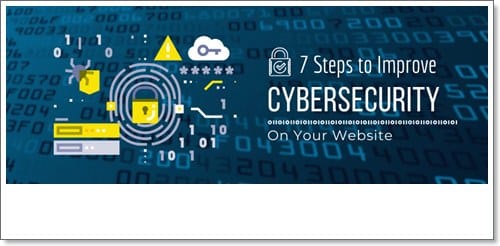
Online sales are very important to businesses. Many companies rely on the total of their sales through their websites. As a business owner, you know that protecting your website and having a small business cyber security plan is essential. In this blog post, we will discuss seven steps that you can take to improve your cybersecurity on your website. These tips will help keep your website safe from hackers and malware attacks. Follow these steps to protect your business.
How to improve cybersecurity on your website
Websites became a target for hackers because of the increased reliance on online transactions and the subsequent rise in security breaches. Companies have placed a premium on securing their websites, which has given them much concern and necessitated significant investment in cybersecurity.Lots of businesses are turning to investments like keycloak as a service or other software that can assist in defending your business.
Protect your website’s private information and keep your company’s database safe from cyber-attacks with the help of cybersecurity services Orlando, and eliminate current web system vulnerabilities. Avoid suffering through a security breach by taking action in advance of any issues developing because there are more serious cyber-attacks that a business can endure than we recognize. Luckily, the best methods are often the simplest.
By implementing these web security solutions, you will help protect yourself and your company from online threats:
Install an SSL Certificate:
An SSL certificate is a digital certificate that authenticates the identity of a website and encrypts information sent to the server using SSL technology. Installing an SSL certificate on your website will ensure that all data transmitted to and from your site is protected from eavesdroppers and man-in-the-middle attacks.
Change your passwords regularly:
You should change your passwords regularly to ensure that your accounts are not hacked. Hackers can use password-cracking tools to guess your password if it is weak or easy to remember. Use a strong password that contains a combination of letters, numbers, and special characters. Using a cybersecurity extension tool would make this task easier. Guardio alerts you when it’s time to change or update your passwords.
Keep Your Software Up to Date:
One of the most important things you can do to keep your website safe is to make sure your software is up to date. This includes updating your content management system (CMS), plugins, themes, and any other software you are using on your site. Outdated software is one of the main ways hackers gain access to websites, so it’s important to keep everything up to date.
Keeping your software updated will help you be protected against malware that causes intrusive notifications, which most of the time are connected to other malvertising sources. Guardio extension keeps you safe by tracing the sources of notifications and blocking them.
Use a VPN:
A VPN encrypts your traffic and routes it through a remote server, making it difficult for anyone to snoop on or intercept your traffic. This is especially important when you are using public Wi-Fi, as these networks are often unsecured. A VPN will also protect you from malicious websites that could infect your device with malware. Phishing and other scams can trick you into giving away personal information like passwords and user names. Guardio’s security team works tirelessly to develop new features that will better detect phishing and other malicious sites.
Install a Web Application Firewall (WAF):
A web application firewall (WAF) is a security mechanism that monitors and blocks requests containing harmful code or assaults. WAFs can be implemented as hardware appliances, software applications, or cloud-based services. The Sucuri WAF is a cloud-based security solution that protects websites from malware, hacking attempts, and other online dangers. It includes features such as activity monitoring, blacklisting, rate limiting, and application-level firewall restrictions. Other security solutions, such as those that rely only on boycotts, do not have these features. Guardio’s security team develops in-house features to enhance phishing and other malicious site detection. Guardio immediately blocks this dangerous site.
Back up Your Website:
Backing up your website is important in case your site is hacked, or you accidentally delete something. You can quickly restore your site to its previous state by having a backup.
There are many plugins that can help you automate the process of backing up your website. Guardio also offers website backup services to help you keep your data safe.
Secure your servers and scan your website:
You should also secure your servers and scan your website for malware regularly. Although choosing a cheap hosting service might be tempting, these options usually mean you have to share the server with many other websites. This makes it much easier for your site to get hacked. It’s always better to choose a secure server with the right specifications for you and your website’s needs. Guardio performs a thorough security scan to detect and notify users of harmful downloads.
Conclusion
By following these eleven steps, you can significantly improve your website’s cybersecurity. However, it’s important to remember that no website is 100% secure. There are always new threats emerging, so it’s important to stay up-to-date on the latest security news and trends. Guardio can help you do this by providing timely alerts and notifications about new risks. Stay safe out there!
Leave a Reply
You must be logged in to post a comment.